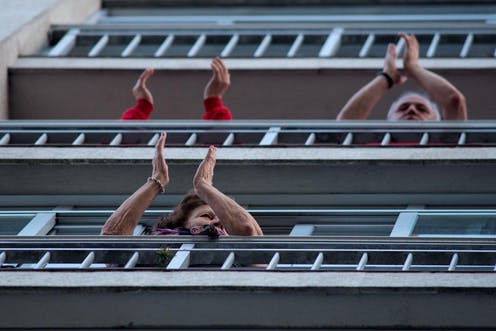- It is a heartfelt response to a genuinely critical situation that touches us all
- It allows us to express gratitude to those tackling the crisis
- We believe it is genuinely helpful to others
- We understand what it is about
- Everyone joins in (almost)
- We feel a powerful sense of connection with other participants, both near and far
- It has come ‘from below’, it hasn’t been imposed on us
- Beyond its primary purpose of thanking key workers, it also expresses three other religious needs:
- It gives us a glimpse, a taste, of a longed for future, in this instance, the time when we will be able to interact freely again
- It allows a release of pent up emotion that is shared and enhanced with others
- It raises our morale and the morale of others
But real change is possible if we allow the eight o’clock clap to awaken in us a dormant understanding of what worship is capable of. Each element listed above is present on Thursday evenings, and can be, should be present on Sunday mornings. We need to consider them all, but this week, let’s look at just two of these elements:
- It is a heartfelt response to a genuinely critical situation that touches us all
- It allows us to express gratitude to those tackling the crisis

The problem is that two core church functions, Mission and Worship, get out of sync with each other. By Mission, I mean the good works done by the church during the week. Most churches are strong in Mission work, but there are two common problems.
Firstly, Mission is disconnected from the worshipping life of the church. There’s excellent mission work, but the congregation don’t feel ownership of it. A few people in the church do Mission, while the majority are only vaguely aware of what happens, and the worship service does nothing to inform them. This means that the Mission workers are not lifted up by prayers and preaching, and the worship is deprived of a vital source of spiritual energy. When Mission and Worship feed each other, both receive a mighty boost.
The second problem is that Mission work often fails to make personal connections. Too often the church’s good works seem abstract and anonymous. Raising funds for good causes is always worthwhile, but doing so at arm’s length is another way in which we deprive ourselves of spiritual energy that would otherwise flow through the life of the church. Mission feeds worship, and worship energises Mission.
The best Mission work brings us into relationship with the people we are supporting, and there are loads of ways to do this. Here are a few things we could do together as a church once the lockdown is over.
In our locality:
- Befriend vulnerable people through a Befriending scheme
- Start a lunch club for old people, so many of whom experience chronic loneliness
- Run a conversation club for refugees and asylum seekers to help them improve their English
- Form and host support groups for people living with chronic pain or addictions
- Invite homeless people for a free breakfast at the church once a week
- Make use of local authority volunteer managers to bring local people alongside you in your mission
- Choose a local charity and become long term partners, raising funds, volunteering, and educating yourself about their work
- Use your premises and connections to collect second hand furniture for people in tight situations who are struggling to set up a home, and then take an ongoing interest in the recipients
- Start a youth club or after school club
- Write to those imprisoned for their faith with Christian Solidarity Worldwide
- Find a church in the developing world to support and partner with long-term
- Focus on fewer charities, and select ones that allow you to deepen your awareness and appreciation of specific projects in specific places
- Twin your toilet, and learn about the corresponding community
- Sponsor children
So often our worship can be dull and lifeless, but it doesn’t have to be like this. The concerns we express in worship on Sundays will gain new power if during the week we connect personally with those in crisis, so that their names, faces and personal situations are truly present with us on Sundays. Our problem is not what we are doing on Sundays. It’s what we are not doing from Monday to Saturday that makes our Sundays so flat.
Whenever we get to worship in church again, let’s make it so that our worship is always permeated with personal concern and longing for those in crisis, and those in the frontline of helping them. That means forming relationships through Mission, then finding ways for it to inform our worship. We can do this. We’re not short of creativity or desire, and the prize is great: Mission and Worship that lift each other, bringing new life to our churches.



Comments
Post a Comment